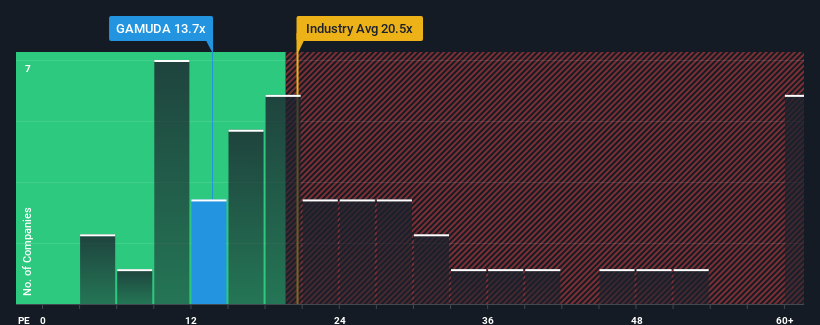- Malaysia
- /
- Construction
- /
- KLSE:GAMUDA
Gamuda Berhad (KLSE:GAMUDA) Looks Inexpensive But Perhaps Not Attractive Enough
With a price-to-earnings (or "P/E") ratio of 13.7x Gamuda Berhad (KLSE:GAMUDA) may be sending bullish signals at the moment, given that almost half of all companies in Malaysia have P/E ratios greater than 16x and even P/E's higher than 28x are not unusual. Nonetheless, we'd need to dig a little deeper to determine if there is a rational basis for the reduced P/E.
With its earnings growth in positive territory compared to the declining earnings of most other companies, Gamuda Berhad has been doing quite well of late. One possibility is that the P/E is low because investors think the company's earnings are going to fall away like everyone else's soon. If you like the company, you'd be hoping this isn't the case so that you could potentially pick up some stock while it's out of favour.
Check out our latest analysis for Gamuda Berhad

What Are Growth Metrics Telling Us About The Low P/E?
Gamuda Berhad's P/E ratio would be typical for a company that's only expected to deliver limited growth, and importantly, perform worse than the market.
Retrospectively, the last year delivered an exceptional 57% gain to the company's bottom line. The latest three year period has also seen an excellent 195% overall rise in EPS, aided by its short-term performance. So we can start by confirming that the company has done a great job of growing earnings over that time.
Looking ahead now, EPS is anticipated to climb by 5.6% per year during the coming three years according to the analysts following the company. That's shaping up to be materially lower than the 9.8% each year growth forecast for the broader market.
In light of this, it's understandable that Gamuda Berhad's P/E sits below the majority of other companies. It seems most investors are expecting to see limited future growth and are only willing to pay a reduced amount for the stock.
The Final Word
It's argued the price-to-earnings ratio is an inferior measure of value within certain industries, but it can be a powerful business sentiment indicator.
We've established that Gamuda Berhad maintains its low P/E on the weakness of its forecast growth being lower than the wider market, as expected. At this stage investors feel the potential for an improvement in earnings isn't great enough to justify a higher P/E ratio. Unless these conditions improve, they will continue to form a barrier for the share price around these levels.
Plus, you should also learn about these 2 warning signs we've spotted with Gamuda Berhad.
If these risks are making you reconsider your opinion on Gamuda Berhad, explore our interactive list of high quality stocks to get an idea of what else is out there.
New: Manage All Your Stock Portfolios in One Place
We've created the ultimate portfolio companion for stock investors, and it's free.
• Connect an unlimited number of Portfolios and see your total in one currency
• Be alerted to new Warning Signs or Risks via email or mobile
• Track the Fair Value of your stocks
Have feedback on this article? Concerned about the content? Get in touch with us directly. Alternatively, email editorial-team (at) simplywallst.com.
This article by Simply Wall St is general in nature. We provide commentary based on historical data and analyst forecasts only using an unbiased methodology and our articles are not intended to be financial advice. It does not constitute a recommendation to buy or sell any stock, and does not take account of your objectives, or your financial situation. We aim to bring you long-term focused analysis driven by fundamental data. Note that our analysis may not factor in the latest price-sensitive company announcements or qualitative material. Simply Wall St has no position in any stocks mentioned.
About KLSE:GAMUDA
Gamuda Berhad
An investment holding company, engages in the civil engineering construction business in Malaysia, Vietnam, Australia, Singapore, Taiwan, and Qatar.
Reasonable growth potential with mediocre balance sheet.
Market Insights
Community Narratives




